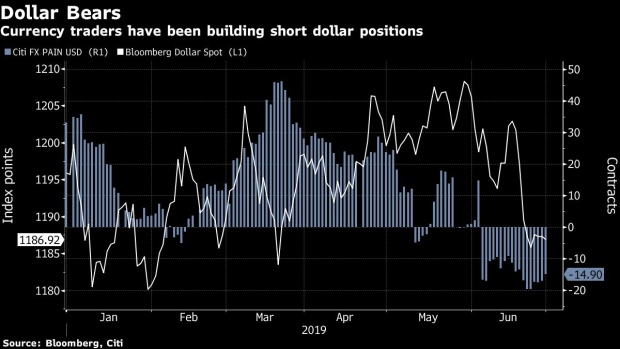Jul 1, 2019
Sell Dollar as Trade Truce Won't Stop Fed Rate Cuts, Funds Say
, Bloomberg News

(Bloomberg) -- The U.S.-China trade truce hasn’t been enough to shake out one favorite trade: shorting the dollar.
The agreement has done little to shift overall market pricing for Federal Reserve interest-rate cuts, which means markets will keep selling the greenback, according to Aberdeen Standard Investments. Should the U.S. and China eventually reach a full-fledged trade deal, the greenback will lose appeal as a haven, AMP Capital Investors Ltd. says.
The dollar has weakened about 2% from this year’s high in May after the Fed flagged it was open to lowering borrowing costs for the first time in more than a decade. Funds have cut long positions on the world’s reserve currency for three straight weeks, with swap markets indicating a rate cut in July will kick off an easing cycle.
“The U.S. dollar has peaked, and once a deal is eventually announced and the Fed cuts interest rates, we’ll see it trend even lower,” said Shane Oliver, head of investment strategy at AMP Capital in Sydney. “It won’t fall in a straight line, but it will fall.”
Emerging markets will be the biggest beneficiaries of a weak dollar, Oliver said.
Aberdeen Standard Investments is shorting the greenback against the Aussie and some Asian currencies, said David Choi, head of Australian macro and fixed income in Sydney.
“Without a material geopolitical shock in markets, which the G-20 meeting averted to some degree, we think there is room for the U.S. dollar to depreciate against the cyclical currencies like the Australia and New Zealand dollars,’’ Choi said. “We do see dollar weakness as one of the key themes in markets going forward.”
Fed Pricing
Before the G-20 meeting, futures traders had priced in about a percentage point of Fed rate cuts in the coming year. While they trimmed bets a little Monday, the market is still expecting a quarter-point move this month and about 1% in total cuts by year-end.
With few details released so far about the U.S.-China trade truce, traders are waiting on this Friday’s U.S. payrolls report for indications on the strength of the world’s biggest economy and the prospect for policy easing.
QIC Ltd., which manages the equivalent of $60 billion, has ratcheted up short positions in the dollar against the euro and the yen.
“Six-to-12 months ago, there was a clear period of exceptionalism in the U.S.,” said Stuart Simmons, senior portfolio manager at QIC in Brisbane. “They had exceptional Fed policy compared to other central banks, corporate earnings, equity market performance. Now you’re at an inflection point where that exceptionalism is being challenged in almost all areas.”
Trade Timeline
Salter Brothers Asset Management Pty has been buying the dollar against the Aussie for the past 18 months and says it will keep doing until it sees a definitive end to the trade war.
“We’ve been at a trade truce before,” said George Boubouras, Melbourne-based director at the money manager. “Until there’s more signs of global growth momentum, of a timeline to a trade deal, we’re happy to maintain the long dollar trade.”
To contact the reporter on this story: Ruth Carson in Singapore at rliew6@bloomberg.net
To contact the editors responsible for this story: Tan Hwee Ann at hatan@bloomberg.net, Nicholas Reynolds
©2019 Bloomberg L.P.